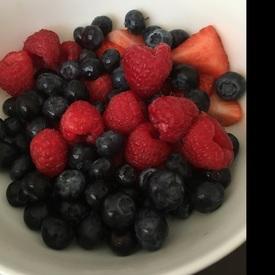Insulin resistant? What’s working for you?

fastfoodietofitcutie
Posts: 524 Member
Just staying under calories and moderate carbs isn’t working for me. I’m guessing I need to go low carb. Just trying to see what others are doing who are insulin resistant.
1
Replies
-
Working in what way? To lose weight or to lower your blood sugar? How are you determining whether something is or is not working? How long have you been consistently doing whatever for? And what do you consider to be 'moderate carbs'?
To lose weight - a calorie deficit.
To lower my blood sugar - not sure. I keep my carbs at under 130g a day (the level suggested by Diabetes UK) and I lost weight. I don't know which worked with regards to getting my blood sugar number back to below even the pre-diabetes figure, but the combination definitely did.
It took me 2 years to lose the weight I wanted to lose, but then I lost quite a bit more until I finally figured out that my maintenance number is quite a bit higher than MFP thinks it is.
I switched to maintenance last March, just as so many things changed, so I didn't have a baseline when gyms, bars and restaurants closed; at the same time, I got furloughed (no endless supply of snacks in the office) and was out walking every day. I now think that my gym exercise cals were over-estimated. As I ate all my exercise calories (and still do), I was probably eating more, net, than I thought whilst losing weight. Now I know I need to eat more, just to maintain my weight - but I'm still eating less than 130g carbs a day.
The UK blood sugar measurement for hbA1c is different to what's used in the US and I don't know where you are. However, here, under 42 is normal, 42-48 is pre-diabetic and over 48 is diabetic.
When I was first diagnosed, in January 2018, my number was 60.
There were checks in between but by April 2019, I'd lost 11kg (24lb) and my number was 48.
In November 2019, I'd only lost another 2.5kg (5.5lb) but my blood sugar was down to 43 - by this stage I was trying to keep my carbs under 100g a day.
When I had my last blood test in December 2020, I'd lost another 6.5kg (14lb) and my blood sugar was 38.
I haven't taken any diabetic medication at all, so that isn't a factor. It's purely been weight loss and/or keeping my carb intake under control that has brought my blood sugar number down.
4 -
Losing weight and light exercise (brisk walk for 20-30 minutes) after meals goes a long way to lowering your blood sugar levels and helping your body process the insulin it creates.4
-
When I was diagnosed with insulin resistance- my doctor told me a low glycemic diet was best for me. Through diet I was able to get off Metformin.1
-
Talk to your doctor. I assume by "insulin resistant" you mean you got a BG reading > 100. Whatever your doctor says to do, do. S/he is certain to tell you that losing weight and getting regular exercise will help, beyond that it depends on the specifics of the person and situation.0
-
I am doing a combination of several diets (DASH, ADA, and WW). For weight loss, I stick to lean proteins (with a goal of near 100 grams per day), at least five servings of fruits and non starchy vegetables, adequate calcium and plenty of water.
If I have red meat, it is twice per week or less.
If I have potatoes, I stick to red potatoes (lower glycemic index) and limit them to twice per week or less.
I am not a huge bread person. If I have it, it is because I know that it is going to be delicious (like homemade). Sometimes, I might eat crackers, but not very often.
I try to fill on fruits and vegetables. If they aren't cutting it, I have a piece of chicken, a serving of nuts or a boiled egg for a snack. Like diabetics, I think that it is good to combine a protein with the fruit -- think apple or banana with peanut butter, serving of nuts or a slice of cheese or turkey. With the fat in nuts and cheese, you need to be conscious of the serving size. My body does not start making insulin when it is supposed to in the morning, but continues making it longer at night. It used to cause me to wake up at 3:00 a.m. To prevent that, I have a fruit smoothie and peanut butter (with mini chocolate chips) right before bed. It has helped with cravings and it helps me sleep better.
I am trying to eat breakfast to see if my body will start to normalize with the insulin productions. It is usually just coffee with skim milk and a cup of Cheerios.
I try to have a preemptive snack between meals whether I am hungry or not. It is likely just a piece of fruit.
Because I also have PCOS, I find that I lose weight much faster if I stay away from processed foods and artificial sweeteners.
0 -
Pridgenization wrote: »I am doing a combination of several diets (DASH, ADA, and WW). For weight loss, I stick to lean proteins (with a goal of near 100 grams per day), at least five servings of fruits and non starchy vegetables, adequate calcium and plenty of water.
If I have red meat, it is twice per week or less.
If I have potatoes, I stick to red potatoes (lower glycemic index) and limit them to twice per week or less.
I am not a huge bread person. If I have it, it is because I know that it is going to be delicious (like homemade). Sometimes, I might eat crackers, but not very often.
I try to fill on fruits and vegetables. If they aren't cutting it, I have a piece of chicken, a serving of nuts or a boiled egg for a snack. Like diabetics, I think that it is good to combine a protein with the fruit -- think apple or banana with peanut butter, serving of nuts or a slice of cheese or turkey. With the fat in nuts and cheese, you need to be conscious of the serving size. My body does not start making insulin when it is supposed to in the morning, but continues making it longer at night. It used to cause me to wake up at 3:00 a.m. To prevent that, I have a fruit smoothie and peanut butter (with mini chocolate chips) right before bed. It has helped with cravings and it helps me sleep better.
I am trying to eat breakfast to see if my body will start to normalize with the insulin productions. It is usually just coffee with skim milk and a cup of Cheerios.
I try to have a preemptive snack between meals whether I am hungry or not. It is likely just a piece of fruit.
Because I also have PCOS, I find that I lose weight much faster if I stay away from processed foods and artificial sweeteners.
To combat high blood sugar levels, I would recommend adding a protein source to your breakfast. Cheerios are carbs and will increase your blood sugar levels, if you pair a carb with a good source of protein your blood sugar will not go as high and normalize faster than eating carbs alone.
I also have PCOS and have had 3 gestational diabetes pregnancies and I learned that trick then.
2
This discussion has been closed.
Categories
- All Categories
- 1.4M Health, Wellness and Goals
- 398.1K Introduce Yourself
- 44.7K Getting Started
- 261K Health and Weight Loss
- 176.4K Food and Nutrition
- 47.7K Recipes
- 233K Fitness and Exercise
- 462 Sleep, Mindfulness and Overall Wellness
- 6.5K Goal: Maintaining Weight
- 8.7K Goal: Gaining Weight and Body Building
- 153.5K Motivation and Support
- 8.4K Challenges
- 1.4K Debate Club
- 96.5K Chit-Chat
- 2.6K Fun and Games
- 4.8K MyFitnessPal Information
- 12 News and Announcements
- 21 MyFitnessPal Academy
- 1.5K Feature Suggestions and Ideas
- 3.2K MyFitnessPal Tech Support Questions




